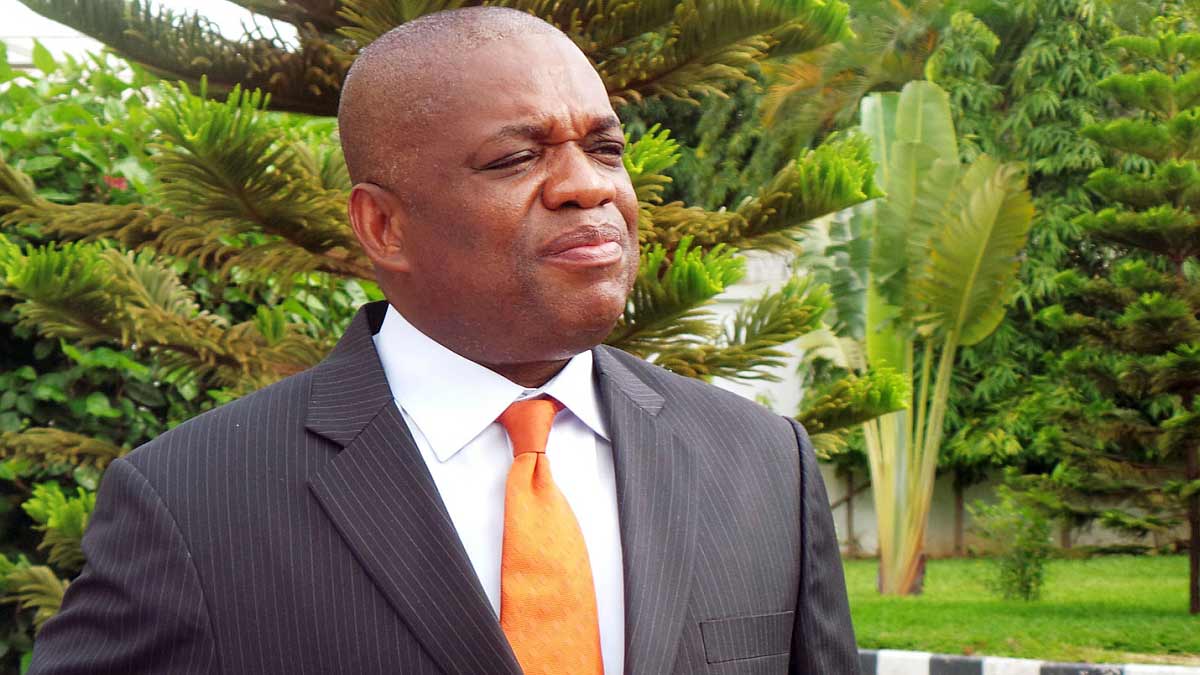Orji Kalu, a convicted senator and former Abia State governor, on Tuesday, December 17, 2019, prayed a Lagos Division of the Federal High Court to grant him bail from the Ikoyi Custodial Centre pending the determination of an appeal against his conviction.
In an application filed by his lawyer, Lateef Fagbemi, Kalu sought his release from prison pending the outcome of his appeal at the Court of Appeal.
Kalu, a senator representing Abia North, was convicted on December 5, 2019, and sentenced to 12 years in prison for a N7.6 billion fraud.
Mohammed Idris, the judge, also ordered that assets belonging to the former governor’s company, Slok Nigeria Limited, be forfeited to the Nigerian government, a directive the Economic and Financial Crimes Commission began enforcing last weekend.
Grounds for bail
According to Fagbemi, a senior advocate of Nigeria, Kalu’s bail application is premised on 23 grounds and supported by a 38-paragraph affidavit.
He added that after receiving the counter-affidavit filed by the prosecution, he filed a 34-paragraph further affidavit with one exhibit attached.
Fagbemi also drew the court’s attention to a notice of appeal against Kalu’s conviction and relied on the provisions of Sections 241 of the Constitution in urging the court to grant the bail.
“If there is a right of appeal, then there is a corresponding right of bail pending appeal,” he said.
Citing Sections 6 of the Constitution, Fagbemi argued that the court had the powers to entertain such an application since post-judgement jurisdiction were anchored on the section.
He said the bail would enable Kalu to attend to his health as well return to the National Assembly to carry out service to the nation.
However, EFCC counsel, Rotimi Jacobs, opposed the bail application.
“Although bail is generally a right of an accused as guaranteed by the Constitution, it is not a right available to a convict because the presumption of innocence had crystallised into guilt and conviction,” said Mr Jacobs, a senior advocate of Nigeria.
According to Jacobs, an application for bail pending appeal is sparingly granted.
He said such a bail could be granted in a situation where the term of imprisonment would have elapsed before determination of the appeal.
He argued that that was not the situation with Mr Kalu’s case.
On Kalu’s health condition, Mr Jacobs said there was no recent medical report to show his state of health, arguing that the medical report tendered in his case was done more than a year ago.
Jacobs added that the request by Mr Kalu to be released on bail so as to seek traditional medicine was not tenable, as visitors were allowed into the custodial centre.
“He says he needs his herbalist to treat him but he has not said that his herbalist came to the prison and was not allowed to see him.
“In one breath, the applicant is saying that he wants to be released on health grounds while in another breath, he is saying that as a senator, he needs to be released on bail so as to carry out his official functions,” he said.
Citing the case of the Federal Republic of Nigeria vs Joshua Dariye, he argued that the Nigerian criminal jurisprudence was robust enough to handle an appeal and dispense with same within a reasonable time.
Besides, he argued that the medical facilities at the Ikoyi Custodial Centre were capable of handling Mr Kalu’s medical condition.
Mohammed Liman, the judge, adjourned the case until December 23 for ruling on the bail application.
The News Agency of Nigeria, NAN, recalls that EFCC had on Oct. 31, 2016, preferred a 34-count charge bordering on N3.2 billion fraud against the convicts.
The charge was, however, on July 16, 2018, amended and increased to 39 counts with the sum increased to N7.2 billion.
EFCC had charged Kalu with utilising Slok Nig. Ltd. to retain N200 million in the First Inland Bank (now FCMB).
The commission said that the sum formed part of funds illegally derived from the coffers of the Abia Government.
In one of the counts, EFCC said that Slok Nig. Ltd. and one Emeka Abone, who is said to be at large, retained N200 million in the company’s account on behalf of Mr Kalu.
In counts one to 10, the commission said that the convicts retained in different bank accounts, about N2.5 billion belonging to the Abia Government.
It said that the convicts diverted cumulatively over N7.2 billion from the Abia treasury during Kalu’s tenure as the governor, in contravention of Sections 15(6), 16 and 21 of the Money Laundering (Prohibition) Act, 2005, Money Laundering Act of 1995 as amended by Act No.9 of 2002, and Section 477 of the Criminal Code Act of 1990.







